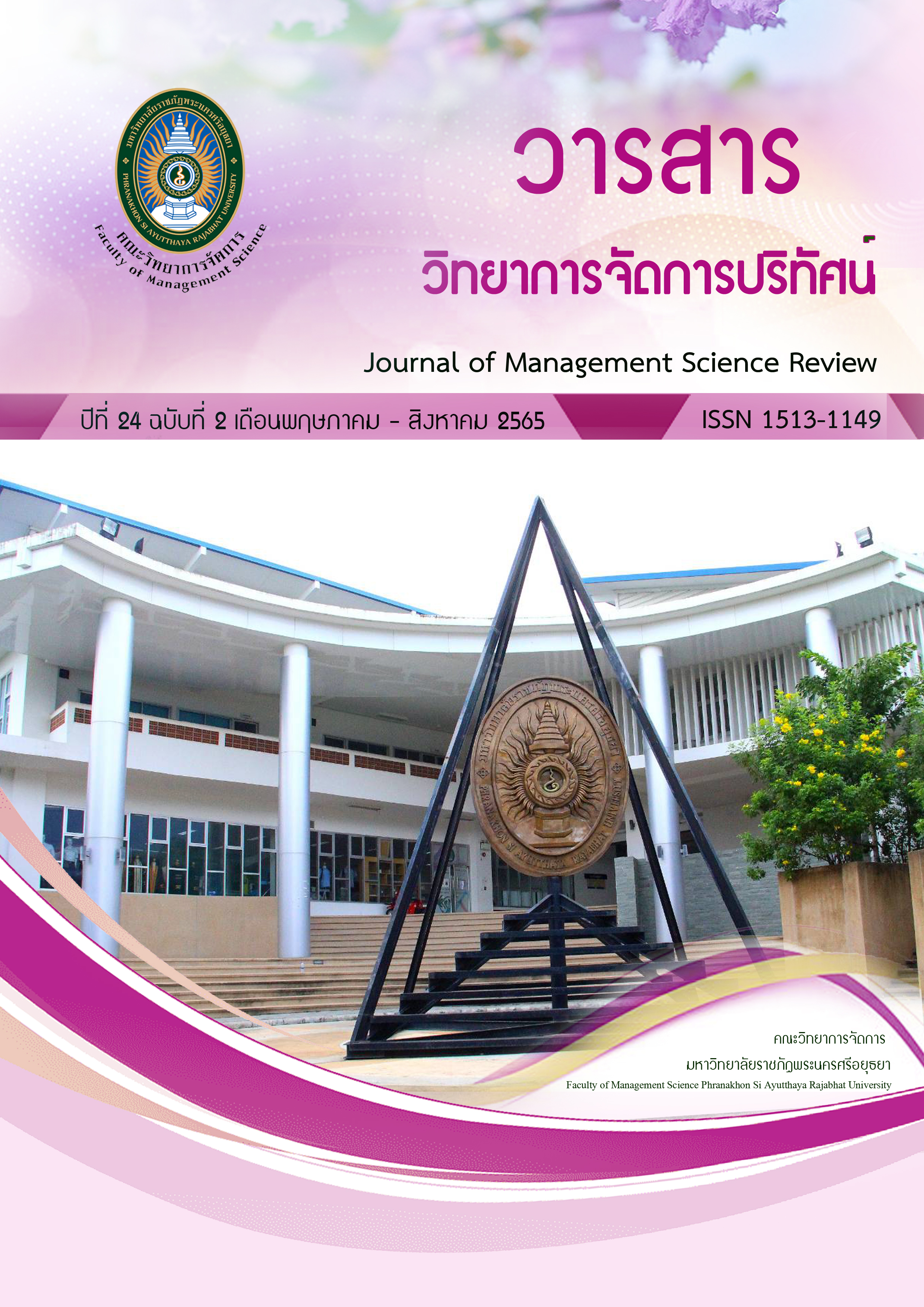The Development of Computer Labs Reservation System via LINE Official Account for Students of the Faculty of Management Science in Rajabhat Rajanagarindra University
Keywords:
Laboratory Reservation System, LINE Office Account, Business ComputerAbstract
This research aimed to 1) develop a computer lab reservation system via LINE official account for students of faculty of management science, Rajabhat Rajanagarindra University, and 2) study the effect of satisfaction with the use of such a computer lab reservation system. The sample group consisted of the 1–4-year business computer program students, the Faculty of Management Science, Rajabhat Rajanagarindra University, who enrolled in semester 2/2564 and accessed the computer lab reservation system developed. Thirty students were sampled using the stratified sampling method. The data were collected using a demand survey. The reservation system was developed using a platform for creating LINE Bot Designer with Dialogflow. The reservation system was connected to the Cloud Service using Intergromat and Webhook. The online questionnaire was created using Google Forms and Google Sheets was used to store the databases. A web service was built utilizing LINE Notify for real-time reservation notification and for assessing the satisfaction with the use of the reservation system developed. The results demonstrated that the reservation system developed according to the 6-step system development cycle was developed step by step and met the students’ needs conveniently and quickly. The overall system usability assessment result indicated the highest level of satisfaction, having a mean of 4.63 and a standard deviation of .49.
References
จีรเศรษฐ์ แพมงคล. (2556). การออกแบบและพัฒนาระบบสารสนเทศการขอใช้บริการยานพาหนะ กรณีศึกษา คณะมนุษยศาสตร์ มหาวิทยาลัยเกษตรศาสตร์. วิทยานิพนธ์วิทยาศาสตรมหาบัณฑิต สาขาวิชาวิศวกรรมเว็บ, มหาวิทยาลัยธุรกิจบัณฑิตย์.
ชิดชนก เชิงเชาว์. (2553). ระเบียบวิธีวิจัยทางการศึกษา. ปัตตานี: มหาวิทยาลัยสงขลานครินทร์.
นัชฐภรณ์ อ่อนแก้ว และนิตยา วงศ์ภินันท์วัฒนา. (2558). การศึกษาปัจจัยที่มีผลต่อความตั้งใจในการซื้อสินค้าหรือบริการที่มีการโฆษณาผ่านบัญชีอย่างเป็นทางการของไลน์ (LINE official account) ของผู้บริโภค. วารสารระบบสารสนเทศด้านธุรกิจ, 1(1), 43-58.
มูลนิธิคีนันแห่งเอเซีย. (2563, 30 เมษายน). การแพร่ระบาดของโควิด-19 สร้างผลกระทบต่อการศึกษาไทยที่สำคัญ 3 ประการ. ค้นเมื่อ 18 เมษายน 2565, จาก https://www.kenan-asia.org/th/covid-19-education-impact/.
เจริญ ภู่วิจิตร์. (2564, 27 สิงหาคม). การจัดการเรียนรู้ทางออนไลน์อย่างมีประสิทธิภาพในยุคดิจิทัล. ค้นเมื่อ 20 เมษายน 2565, จาก http://www.nidtep.go.th/2017/publish/doc/20210827.pdf.
สุธาธินันท์ ช่างทำ. (2558). คุณสมบัติของ LINE Official Account ที่มีผลต่อพฤติกรรมการใช้. วิทยานิพนธ์บริหารธุรกิจมหาบัณฑิต สาขาวิชาธุรกิจระหว่างประเทศ, มหาวิทยาลัยเทคโนโลยีราชมงคลธัญบุรี.
สุนทรีย์ พีระพาณิชย์ และธนพรรณ กุลจันทร์. (2564). การพัฒนาการบริการ และช่องทางประชาสัมพันธ์ โดยใช้ ไลน์ ออฟฟิเชียล แอคเคาท์. อินฟอร์เมชั่น, 28(2), 87-102.
สำนักส่งเสริมและสนับสนุนวิชาการ 2 ชลบุรี. (2564). คู่มือการสร้าง LINE Official Account. ค้นเมื่อ 20 เมษายน 2565, จาก https://drive.google.com/file/d/1Dpo8RZkIJlVdEHFBuPx4BVd5qblAzBJ8/view.
วสุ บัวแก้ว และปณิธิ เนตินันท์. (2563). การพัฒนาระบบ LINE BOT สำหรับบัณฑิตวิทยาลัย. ในการประชุมนำเสนอผลงานวิจัยระดับบัณฑิตศึกษา ครั้งที่ 15 (หน้า 2406-2413). กรุงเทพฯ, มหาวิทยาลัยรังสิต.
วุฒิพงษ์ ชินศรี และวิไลลักษณ์ ตรีพืช. (2564). การพัฒนาระบบบริหารการเข้าร่วมกิจกรรมผ่านไลน์ ออฟฟิเชียล แอคเคาท์. วารสารวิจัยและพัฒนาวไลยอลงกรณ์ ในพระบรมราชูปถัมภ์, 16(2), 27-36.
อภิรดี มวลคำลา และเยาวเรศ จันทะคัต. (2563). การพัฒนาระบบสารสนเทศเพื่อการจัดการกองทุนเงินให้กู้ยืมเพื่อการศึกษา กรณีศึกษามหาวิทยาลัยเทคโนโลยีราชมงคลอีสาน. วารสารแม่โจ้เทคโนโลยีสารสนเทศและนวัตกรรม มหาวิทยาลัยแม่โจ้, 6(1), 27-40.
อรยา ปรีชาพานิช. (2557). คู่มือเรียนการวิเคราะห์และออกแบบระบบ ฉบับสมบูรณ์. นนทบุรี: ไอดีซีฯ.
Burgess, A. (2018). AI in action. In The executive guide to artificial intelligence. Springer Link, 73-89. From https://doi.org/10.1007/978-3-319-63820-1_5
Likert, R. (1932). A technique for the measurement of attitudes. Archives of Psychology, 140, 1–55.





